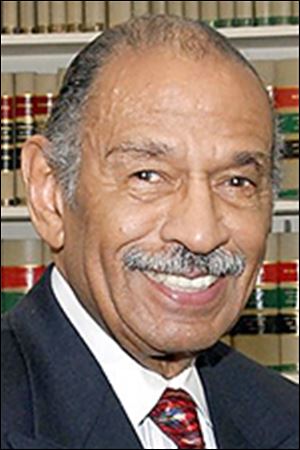
COMMENTARY
Is Rep. Conyers’ storied career over? Don’t bet on it
5/9/2014
Lessenberry
The Blade
Buy This Image

Lessenberry
DETROIT — Last week, when the stunning news broke that U.S. Rep. John Conyers (D., Detroit) might not have enough valid petition signatures to qualify for the primary ballot, I had a flashback to a scene nearly three years ago.
That afternoon, I was the moderator of a panel at the Arab American National Museum in Dearborn, Mich., on the 10th anniversary of the 9/11 terrorist attacks. The topic was the challenges loyal Arab-Americans had faced since that traumatic day.
Suddenly, I noticed that Mr. Conyers had come in. I greeted him. He was asked whether he wanted to say a few words. He did.
Taking the podium, Mr. Conyers, perhaps Congress’ leading proponent of jazz, urged the baffled panelists to spend more time listening to Miles Davis and John Coltrane.

Conyers
Next, he encouraged the audience members to “buy some bus tickets,” and journey to Washington for an upcoming celebration of the anniversary of the Congressional Black Caucus. Evidently sizing up my net worth, he also magnanimously suggested they buy me a ticket so I could go as well.
Afterward, people who were from out of town were stunned. Those familiar with the congressman weren’t surprised.
Nearly 30 years ago, a reporter found Mr. Conyers at a hearing in Nebraska on a topic that was not of pressing concern to any of his committee work. He was asked about this.
“I consider myself to be the congressman from the Planet Earth,” he said. That later became a magazine headline.
However, there is another John Conyers: the man who, as a freshman congressman almost half a century ago, fearlessly stood up to Lyndon Johnson when they disagreed about the Vietnam war.
LBJ was then more powerful than nearly any other president, before or since. He had been elected by a landslide. Mr. Conyers won his first race, in 1964, by a margin of 108 votes. But he didn’t back down.
Mr. Conyers, a man of dignified speech patterns and almost courtly manners, never has. He helped found the Black Caucus back in 1971, at a time when U.S. Rep. Adam Clayton Powell, the dean of black congressmen, was against the idea.
Sometimes ahead of his time, Mr. Conyers sponsored the resolution that made the Rev. Martin Luther King, Jr. Day a national holiday. He was responsible for getting Congress to allow civil rights heroine Rosa Parks to be the first woman in history to lie in state in the Capitol Rotunda.
He launched two of the most bizarre runs for mayor Detroit has ever seen. The first time, he finished third, not even making the runoff. The next time, the same voters who regularly give him 85 percent of their votes in congressional elections gave him 3 percent.
A then-up-and-coming young black lawyer named Melvin “Butch” Hollowell took on who he thought was a weakened Mr. Conyers in the district’s congressional primary.
Suddenly, the shrewd politician resurfaced. Mr. Conyers reminded voters of all he had done for them. Mysteriously, another well-known candidate, then-Detroit ombudsman Marie Farrell-Donaldson, got into the race, dividing the anti-Conyers vote.
But that wasn’t necessary. The congressman got more votes than both his rivals combined.
Two years ago, Mr. Conyers had to run for re-election in a district that was largely new turf, and more than 40 percent white.
Two well-known black lawmakers and a white state senator, sensing opportunity, took him on in the Democratic primary. Mr. Conyers got far more votes than all of them put together.
But nothing lasts forever. Mr. Conyers will, by the end of this term, have been in Congress for half a century. Before the end of this month, he will be 85 years old. The odds are strongly against him again becoming chairman of the House Judiciary Committee.
Democrats are unlikely to win back control of the U.S. House in November. Even if they did, would they restore to the chairmanship of the Judiciary Committee a man who is approaching 90?
The congressman has lived a fascinating life. He fought in the Korean conflict. He went to Mississippi with the Rev. King when that was dangerous.
He worked in Detroit’s dirty factories, then served in Congress longer than any other African-American in history. He became a father for the first time in his 60s.
You could make a good case that it is time for him to write a memoir, not serve another two relatively powerless years. But don’t bet on the congressman agreeing.
Even if he can’t get back on the ballot, he can still try to win the primary with a write-in campaign. Whether or not it makes sense, it is hard to imagine him going gently into that post-congressional night.
Jack Lessenberry, a member of the journalism faculty at Wayne State University in Detroit and The Blade’s ombudsman, writes on issues and people in Michigan.
Contact him at: omblade@aol.com